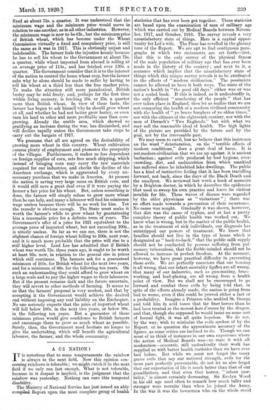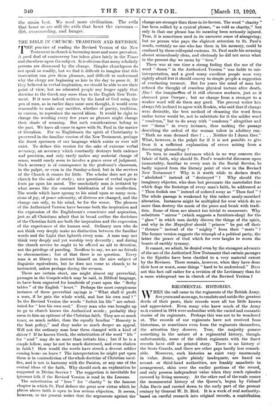A C S NATION TT is notorious that to some
temperaments the rainbow is always in the next field. Now this opinion con- cerning rainbows is tolerable; we might catch it in the next field if we only ran fast enough. What is not tolerable, because in it despair is implicit, is the judgment that the rainbow was yesterday. Nothing can cure this temporal disability. The Ministry of National Service has just issued an ably compiled Report upon the most complete group of health statistics that has ever been got together. These statistics are based upon the examination of men of military age which was carried out by Medical Boards between Novem- ber, 1917, and October, 1918. The survey reveals a very unsatisfactory state of things. Here is a capital oppor- tunity for Lot's wife. The Press has revelled in the gloomy tone of the Report. We are apt to find contiguous para- graphs in which two statements are set forth—first, that this is the only survey of the physical fitness of the male population of military age that has ever been made in the history of the country ; and next to it, a sentence which implies that the unsatisfactory state of things which this unique survey reveals is to be attributed to the effects of " modern civilization." The pessimists cannot be allowed to have it both ways. The state of the nation's health in "the good old days" either was or was not a sealed book. If this is indeed, as it undoubtedly is, the only efficient " numbering of- the people " that has ever taken place in England, then let us realize that we are not comparing the health of a modern civilized community with the health of " ye brave burghers of ye olden times," nor with the citizens of the eighteenth century, nor with the men of Disraeli's " Two Englands," but with what we may call the reasonable ideal of health. The high lights of the picture are provided by the future and by the goal, not by the irrevocable past.
We may seem to cavil, but we believe that this insistence on the word " deterioration, on the " terrible effects of modern conditions," does a great deal of harm. It is not modern civilization that we are up against. it is ancient barbarism; against evils produced by bad hygiene, over- crowding, dirt, and malnutrition from which mankind has suffered since he inhabited lake dwellings. The public has a kind of instinctive feeling that it has been travelling forward, not back, since the days of the Black Death and the smallpox. We reviewed last week a book of memoirs by a Brighton doctor, in which he describes the epidemics that used to sweep his own practice and leave its victims invalids for life. These waves of disease were regarded by the older physicians as " visitations " ; there was no effort made towards a prevention of their recurrence. No cause was sought. Gradually it was shown, however, that dirt was the cause of typhus, and at last a pretty complete theory of public health was worked out. We know what is wrong, but in the matter of the public health, as in the treatment of sick individuals, our diagnosis has outstripped our powers of treatment. We know that families should not live in the type of house which is designated as " back-to-back," that the public milk supply should not be conducted by persons suffering from pul- monary tuberculosis, that the feeble-minded should not be allowed to increase in perfect freedom. At the moment, however, we have great practical difficulty in preventing these .evils. We are perfectly conscious that our housing is all wrong, that our infant-mortality figifres are all wrong, that many of our industries, such as gun-making, brass- working, and lead-glazing, are all wrong, from- a health point of view. But we shall not be encouraged to go forward and combat these evils by being told that, in spite of the efforts already made, the nation is going from bad to worse, even if this could be proved either a fact or a probability. Imagine a Princess who scolded St. George and told him in acid tones that far finer heroes than he had been treated as the merest hors d'csuvre by the dragon, and that, though she supposed he would insist on some sort of formal fight, it was all quite hopeless. We do not, by the way, wish to minimize the evils spoken of by the Report, or to question the approximate accuracy of the figures, as some critics are inclined to do. Though we can most of us think of instances in our own experience where the action of Medical Boards was—to state it with all moderation—eccentric. still undoubtedly their work has supplied us with better health statistics than we have ever had before. But while we must not forget the many grave evils that sap our national strength, evils for the most part perfectly preventable, do not let us also forget that our expectation of life is much better than that of our grandfathers, and that even that horror, " infant mor- tality," is almost certainly decreasing. Sir Evelyn Wood in his old age used often to remark how much taller and stronger were recruits than when he joined the Army. In the war it was the townsmen who on the whole stood the strain best. We need more civilization. The evils that beset us are still the evils that beset the caveman— dirt, overcrowding, and hunger.











































 Previous page
Previous page